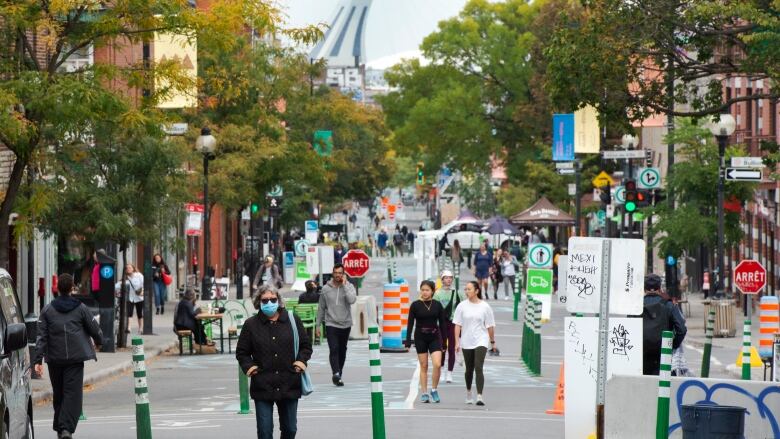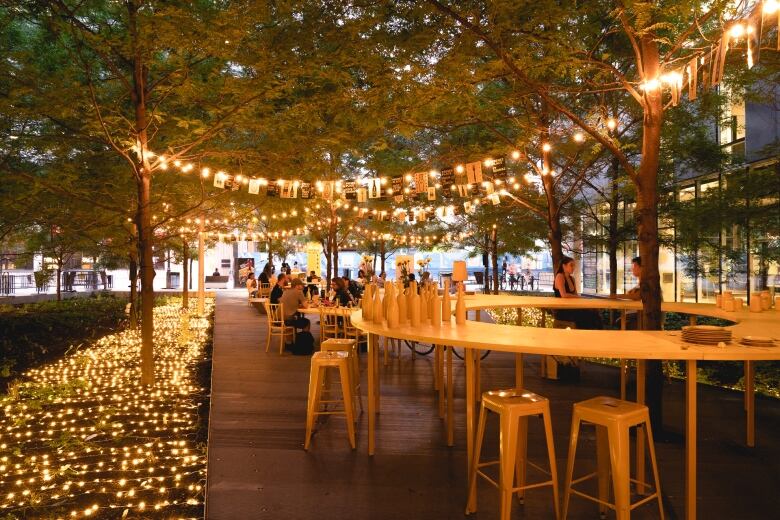City, businesses hope terrasses will counter summer pandemic woes
Plans under way to pedestrianize several commercial arteries

As Montreal heads towarda second summer of the COVID-19 pandemic and its accompanying restrictions, the city and its businesses are looking for ways to make it bearable. Terrasses figure prominently.
Boroughs, local business associations and the City of Montreal are working on plans to pedestrianize several arteries for the summer. Incentives to build terrasseswill abound.
Active mobility corridors, however intended to provide more space for walking and cycling will not return.
Montreal Mayor Valrie Plante's office emphasized that business owners are the catalysts of this summer's projects.
That distinction suggests the city has not forgotten the controversy last springwhen a planned pedestrianization of St-Laurent Boulevard in Little Italy was abruptly cancelled after business owners strenuously objected,sayingthey had not been consulted.
Letting local business owners take the lead is crucial, said Billy Walsh, who heads the Association des Socits de dveloppement commercial de Montral, which represents 20 local merchants' associations.
"We see it very favourably," he said of the city's approach. "Food will be at the heart of our summer and these measures will make our streets sparkle."
The other difference in 2021 is plenty of lead time so businesses can be ready.
"Last year it was done hastily, without a budget," said Glenn Castanheira, the executive director of downtown Montreal's merchant's association. "This time, we're able to prepare in advance."
Pedestrianized Mont-Royalredux
The flagship pedestrianization project last summer on Mont-Royal is likely to be revived, with the city, the borough and the local merchants' association happy with the results in 2020.
This year, the Mont-Royal Avenue merchants' association is aiming to close two kilometres of the street to trafficfrom the beginning of June to the middle of September. Terrasses will likely be allowed to be larger than last year, but several details are still to be resolved, such as the nature of bicycle access and whether it will be possible to avoid cones and concrete blocks to channel vehicle traffic at cross streets which merchants disliked.
"Clearly, the appearance of the area is a priority," said Claude Rainville, the head of the local businesses group. The objective is to make last year's effortbigger and better, he said, so that people who visit the street want to stay.
Plans are also under way to once again close a stretch of Bernard Avenue in Outremont, the borough mayor's office says.
Among others, projects have been proposed by merchants' associations for Wellington Street in Verdun and Masson Street in Rosemont-la-Petite-Patrie.

Trivial terrasse tariffs
Many boroughs will offer permits for on-street terrasses at rates far under the usual thousands of dollars they charge a concept introduced last year to help restaurant, bar and cafowners through the pandemic.
In Ville-Marie, Plateau-Mont-Royal, Rosemont-la-Petite-Patrie, Sud-Ouest, Outremont, Lachine, Verdun, and AhuntsicCartierville, permits will cost $50 or less.
The MercierHochelaga-Maisonneuve borough has decided to eliminate all expenses related to seasonal occupancy for businesses this summer "in order to encourage the development of sidewalk cafs," according to a document prepared for elected officials.
The Rivire-des-PrairiesPointe-aux-Trembles borough also intends to loosen its rulesfor the first time, in order to promote the development of terrasses on its territory, a City of Montreal spokesperson said.
In downtown Montreal, parts of Ste-Catherine and Crescent Streets, among others, will likely be completely closed to traffic on weekends. Terrasses will be installed, with street furniture and entertainment as well as permanent, dynamic, interactive public art, Castanheira said.
"For months, people have been going for walks in the forest," he said. "This summer, we want them to walk in an urban forest. We want to create traffic and fill the terrasses."
In addition, in order to avoid multiple construction sites and accompanying noise in the heart of downtown this summer, the Ville-Marie borough adopted an ordinance this week authorizing construction work to take place on various projects 24 hours a day, between March 13 and June 23.
This includes the redevelopment of Phillips Square and the repairs on Ste-Catherine Street West.
Based on a Radio-Canada story by Romain Schu












_(720p).jpg)


 OFFICIAL HD MUSIC VIDEO.jpg)
.jpg)



























































































